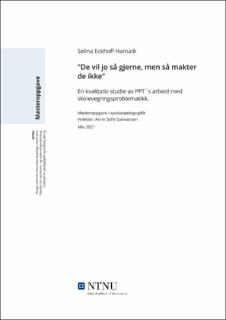| dc.contributor.advisor | Samuelsen, Anne Sofie | |
| dc.contributor.author | Hamadi, Selina Eckhoff | |
| dc.date.accessioned | 2021-09-28T17:42:11Z | |
| dc.date.available | 2021-09-28T17:42:11Z | |
| dc.date.issued | 2021 | |
| dc.identifier | no.ntnu:inspera:79273327:56882378 | |
| dc.identifier.uri | https://hdl.handle.net/11250/2784774 | |
| dc.description.abstract | Dette forskningsprosjektet hadde som hensikt å undersøke hvordan ledere og rådgivere i pedagogisk-psykologisk-tjeneste (PPT) arbeider med skolevegringsproblematikk. Studien tar for seg forståelse og identifisering av skolevegring, arbeid med utforming, iverksetting og oppfølging av tiltak rettet mot elever med skolevegring, og PPT´s rolle i samarbeidet med skole og øvrig tiltakssystem i disse sakene. Den overordnede problemstillingen for studien er: «Hvordan arbeider PPT med å hjelpe elever som sliter med skolevegring?». Studien har et kvalitativt forskningsdesign hvor semi-strukturerte intervjuer er benyttet som datainnsamlingsmetode. Intervjuene ble gjennomført med tre ledere og to rådgivere i PPT, som tilhørte til sammen fire ulike kontorer.
De empiriske funnene blir presentert gjennom de tre hovedkategoriene «identifisering», «tiltak» og «samarbeid» som ble utarbeidet i dataanalysen. Kategorien «identifisering» består av underkategoriene «forståelse av skolevegring», «kriterier for involvering av PPT» og «kartlegging av skolevegring». Kategorien «tiltak» har underkategoriene «forebygging og systemarbeid», «utarbeiding og iverksetting av tiltak» og «oppfølging og evaluering av tiltak». Kategorien «samarbeid» består av underkategoriene «PPT´s rolle overfor skolen», «PPT´s rolle i det tverrfaglige samarbeidet» og «ansvarsfordeling».
Studiens hovedfunn viser til at informantene har et bredt perspektiv på årsaker til utvikling av skolevegring. Samtlige av informantene presiserte i den forbindelse at de benytter ulike varianter av skolefraværsbegrepet om skolevegring. Det blir gjennom denne begrepsbruken tydelig at informantene assosierer skolevegring med fravær, noe som også reflekteres i det faktum at tjenesten hovedsakelig involveres formelt i saker hvor vansker har fått rom til å utvikle seg til et nivå som involverer alvorlig skolefravær. PPT´s rolle fremstår slik som reaktiv i enkeltsaker, også da tjenesten ser ut til å være aktivt involvert i kartleggingsfasen og i utarbeidingen av sakkyndige vurderinger, men ofte trekker seg ut etter dette. Det ble i intervjuene lagt stor vekt på samarbeid med skole og foreldre i utforming og iverksetting av tiltak. På systemnivå ser det ut til at de aktuelle PPT-kontorene i relativt stor grad arbeider med både kompetanseheving og tidlig rådgivning og veiledning på skolenivå. På individnivå ble det hovedsakelig trukket frem praktiske og logistikkbaserte tiltak. Funnene viser store likheter mellom de aktuelle PPT-kontorene i denne fasen. Det ble videre presisert at det ved saker som involverer skolevegring og skolefravær, er viktig at det følges opp tett og over tid. PPT fremstår imidlertid lite aktiv i denne fasen. Ansvaret for tett oppfølging ble av de fleste informantene tillagt skolen, men flere av informantene fremhevde i tillegg at det var behov for en ekstern instans som kunne arbeidet tettere på, og fulgt opp disse elevene i det daglige. Det fremstår likevel uklart hvilken instans informantene mener burde bli tillagt dette ansvaret. | |
| dc.description.abstract | The purpose of this study was to examine how leaders and counsellors in the pedagogical-psychological-service (PPT) work with helping students who struggle with school refusal. The study addresses PPT´s understanding and identification of school refusal, preparation, implementation and follow-up of measures aimed at school refusers, as well as PPT´s role in cooperation with schools and other community-based professionals in these cases. The overall research question for the study is: “How does PPT work to help students who are struggling with school refusal?”. The study uses a qualitative research design and semi-structured interviews as the methodological approach. The empirical data were gathered through interviews with three leaders and two counsellors in PPT, belonging to a total of four different offices.
The empirical findings of this study are presented through the three main categories “identification”, “measures” and “cooperation”, which were prepared through the data analysis. The category “identification” consists of the subcategories “understanding of school refusal”, “criteria for involvement of PPT”, and “assessment of school refusal”. The category “measures” has the subcategories “preventive and system-oriented work”, “preparation and implementation of measures” and “follow-up and evaluation of measures”. The category “cooperation” consists of the subcategories “PPT´s role towards the school”, “PPT´s role in interdisciplinary cooperation” and “division of responsibilities”.
The main findings of the study indicate that the informants have a broad perspective on causes of school refusal. All of the informants emphasized that they use different variations of the concept “school absenteeism” regarding school refusal. Through the use of this term, it becomes clear that the informants associate school refusal with absenteeism, which is also reflected in the fact that the service is mainly formally involved in cases where problems have been allowed to develop to a level involving serious school absence. PPT´s role therefore appears to be reactive in individual cases. This also becomes clear through the fact that the service appears to be actively involved in the assessment phase, but often withdraws after this. During the interviews, great emphasis was placed on cooperation with schools and parents in the preparation and implementation of measures. At the system level, it appears that the relevant PPT offices to a relatively large extent work with both skills development and early counselling and guidance directed towards the schools. At the individual level, practical and logistics-based measures were mainly highlighted. The findings show great similarities between the relevant PPT offices in this phase. It was further emphasized that in cases involving school refusal and school absenteeism, close follow-up over time is important. The responsibility for close follow-up was assigned to the school by most of the informants, but several of the informants also emphasized the need for an external service that could work more closely with and follow up these students on a daily basis. However, it remains unclear which service the informants believe should be given this responsibility. | |
| dc.language | nob | |
| dc.publisher | NTNU | |
| dc.title | "De vil jo så gjerne, men så makter de ikke" - En kvalitativ studie av PPT´s arbeid med skolevegringsproblematikk. | |
| dc.type | Master thesis | |
